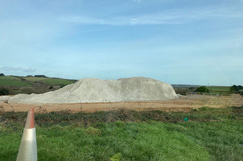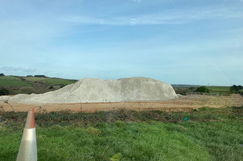National Highways' £330m 8.7-mile dualling scheme on the A30 is using 80% recycled aggregate, Highways can reveal, all of which comes from a by-product from the Cornish china clay mining industry.
Running from Chiverton to Carland Cross, the project is described as a 'vanguard' scheme, with National Highways also forecasting a net biodiversity gain in the region of 20%.

A residue, known as stent, from the local clay mining sector would normally be left in white spoil heaps, but instead the material from the Littlejohns Pit near St Austell is being processed into sustainable secondary sand and aggregate for construction use.
National Highways said the use of stent means the project will use approximately 80% recycled aggregates to 20% primary (virgin) aggregates, saving huge amounts of carbon and material.
Roads minister Baroness Vere said: 'By using natural Cornish materials, we are also ensuring the scheme has a much lower carbon impact and provides a further boost to the local community, which is exactly the kind of innovation we want to see as we strive towards a net zero road network.'
Highways understands there are different grades of the stent recycled materials, which can be used for different aspects of the project.
The recycled aggregates used to date is around 606,000 tonnes with around 423,000 tonnes still to be used. This is compared to approximately 118,000 tonnes of virgin aggregates used to date with 105,000 tonnes to be used.
Compared to the 5kg CO2e per tonne carbon emission of virgin aggregate, the locally imported material is around 2kg CO2e per tonne, representing a reduction of around 3kg CO2e per tonne of aggregate used, National Highways estimates.
The scheme is being delivered by Costain Jacobs and supply chain Aggregate Industries and began in March 2020. It is due to be completed around 2023 to 2024.
Aggregate Industries has also invested over £4m in the nearby Melbur Quarry at St Stephen to produce more carbon-friendly warm mix asphalt for the new road surfacing.
Fully approved by National Highways, warm mix asphalt is a greener process that has less impact on the environment, with reduced hydrocarbon emissions and greenhouse gases.
Nick Simmonds-Screech, National Highways project director for the A30 scheme, added: 'We're already really proud of our environmental and ecological work – we're forecasting a net biodiversity gain in the region of 20% – and this greener way of working also spreads to our construction methods and material supply.'
The cost of developing the scheme is being partly funded by an £8 million contribution from the European Regional Development Fund, with an additional £12m for the construction phase.
The remainder of the cost of developing and delivering the scheme is being funded by central Government.
Caption: Stent, a by-product of local china clay production from Littlejohns Pit, is being used in the construction of the A30 Chiverton to Carland Cross road upgrade
































